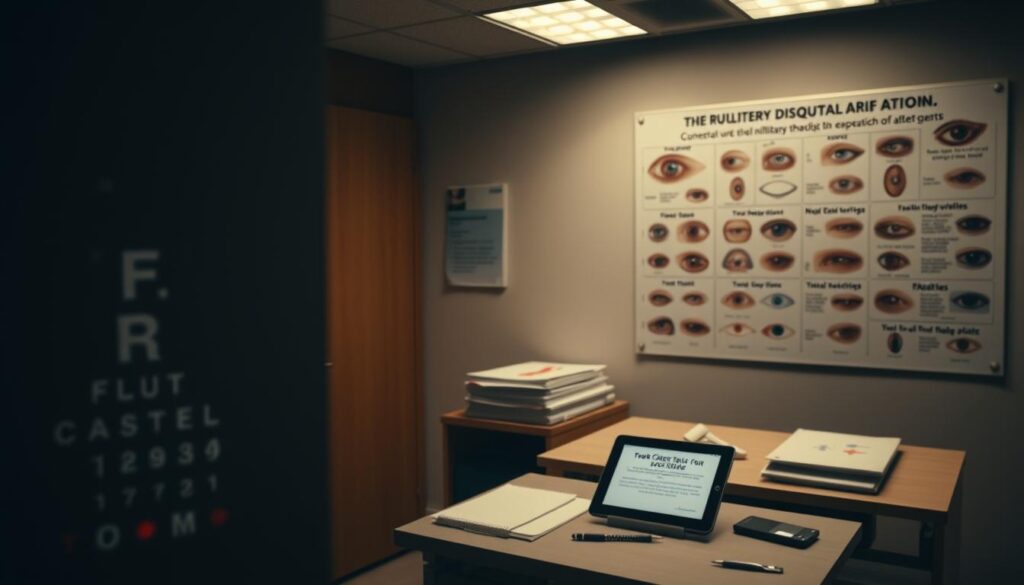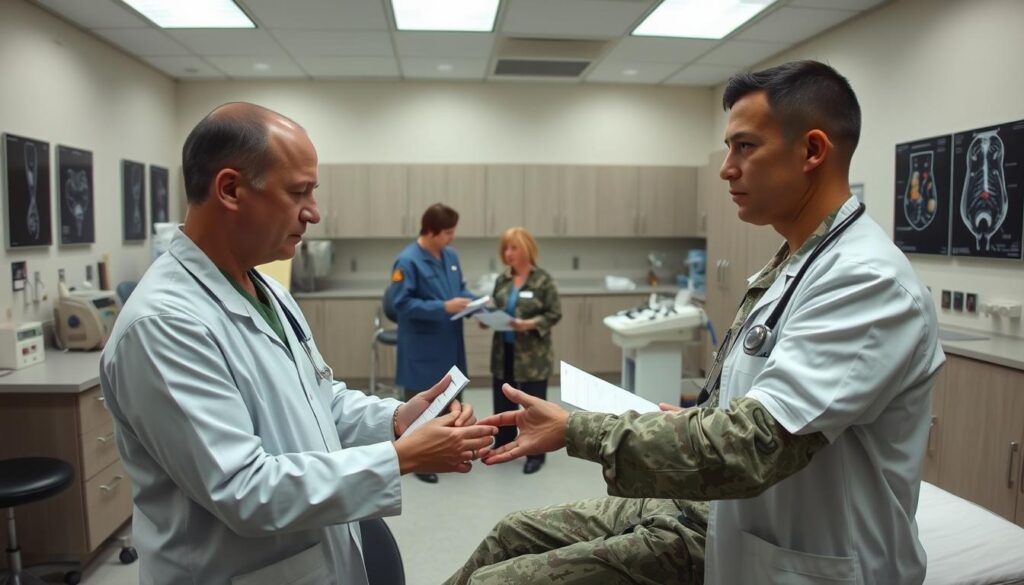Can a small medical condition stop you from joining the military? For those wanting to serve, knowing the strict medical standards is key.
The US military has tough medical requirements. They make sure everyone can do their job well and safely. The “Standards of Medical Fitness” list health issues that can keep you out.
If you want to join, it’s vital to understand these medical standards. Knowing what conditions may disqualify you helps you get ready for enlistment.
Key Takeaways
- Strict medical standards are in place to ensure military personnel can perform their duties safely.
- Various medical conditions can disqualify individuals from military service.
- Understanding these medical requirements is crucial before enlisting.
- Certain health issues may be waived under specific circumstances.
- Knowing the medical standards can help individuals prepare for the enlistment process.
Overview of Army Medical Disqualifications
The Army has strict medical standards to keep its people healthy and safe. These standards help decide if someone is ready for service.
Definition of Medical Disqualifications
Medical disqualifications are health issues that stop someone from joining the Army. These problems can be in different parts of the body. They are found during the MEPS (Military Entrance Processing Station) medical check.
The military disqualification criteria make sure people can handle military life. They check if someone can do the job without danger to themselves or others.
Importance of Medical Standards
High medical standards are key for the Army. They make sure everyone can do their job well. These standards find people who might have health problems.
The Army checks many things during the medical evaluation. They look at medical disqualifying conditions that might stop someone from serving.
Types of Conditions Reviewed
Many health issues are checked during the enlistment process. These include eye, ear, heart, and mental health problems, among others.
The army health assessment looks at many things. It decides if someone is fit for service.
Common Medical Disqualifications
Medical standards are key in deciding if someone can join the Army. They check for medical conditions that might stop someone from serving. It’s important for those thinking about joining to know about these conditions.
Vision and Eye Conditions
Vision and eye problems are big reasons people can’t join the Army. Issues like keratoconus and color vision deficiency can stop you. Also, if your eyes are too far-sighted or near-sighted, you might not make it.
The Army has strict rules for vision. If your eyes don’t meet these standards, you might not be allowed to join.

Hearing Impairments
Hearing problems are another big issue. The Army needs you to hear well to do your job. If you can’t hear well enough, you might not qualify.
Cardiovascular Issues
Heart problems are checked closely too. Issues like hypertension or heart valve disorders can be a no-go. The Army looks at how serious these problems are to decide if you can join.
Mental Health Disorders
Mental health issues are also important. Problems like depression, anxiety disorders, and post-traumatic stress disorder (PTSD) are looked at carefully. The Army considers how serious the issue is and if treatment works.
Medical Evaluation Process
Meeting the army medical requirements means going through a detailed medical check at the Military Entrance Processing Station (MEPS). This step is key to see if someone can join the US Army.
Initial Screening Procedures
At MEPS, the first step is a medical questionnaire and measurements of height and weight. There are also hearing and vision tests, and other medical checks. These steps help find any health problems that might stop someone from serving.
Comprehensive Medical Exam
A detailed medical check is done to see if the applicant is healthy enough. This includes looking at their medical history, a physical exam, and tests for health issues that could stop them from joining the US Army medical standards.

Role of Military Medical Personnel
Military doctors are very important in this process. They do the medical exams, look at the results, and decide if someone is fit for duty. Their knowledge helps make sure only healthy people join the US Army.
| Medical Evaluation Component | Description | Importance |
|---|---|---|
| Initial Medical Questionnaire | Looks at medical history and current health | Finds health problems early |
| Height and Weight Measurements | Checks if body mass index (BMI) is okay | Makes sure recruits are physically fit |
| Hearing and Vision Exams | Checks how well you can see and hear | Important for doing military tasks |
The medical check is a detailed process to keep both the person and the US Army safe. It makes sure recruits are healthy enough for service. Knowing about this process and military medical waivers can help those wanting to join the Army.
Impact of Medical Disqualifications
Medical disqualifications can affect your career in the Army in many ways. They might stop you from taking on certain jobs. But, they don’t mean you can’t serve at all.
Career Opportunities within the Army
Some medical issues can stop you from doing certain Army jobs. For example, vision or hearing problems might keep you out of combat roles. But, the Army has lots of jobs, and some might be right for you.
Alternative Paths for Affected Individuals
If you’re not allowed in certain jobs because of health reasons, don’t worry. You can look into support functions or jobs that don’t need as much physical or sensory ability. The Army has many career paths you can explore, based on your skills and what you can do.
Importance of Follow-Up Care
It’s very important to keep up with your health if you have a condition that makes you not eligible. Taking care of your health might let you reconsider joining the Army or find other jobs in or related to the Army.
| Career Field | Medical Requirements | Potential for Individuals with Medical Disqualifications |
|---|---|---|
| Combat Roles | High physical and sensory standards | Limited |
| Administrative Roles | Lower physical demands, varied sensory needs | Higher |
| Technical Fields | Specific medical standards based on role | Variable, depends on the condition and role |
Waivers and Exceptions
In some cases, people with medical issues can still join the Army with a waiver. This is for those who really want to serve, even with health problems that usually stop them.
Eligibility for Medical Waivers
To get a medical waiver, several things matter. These include the type of health issue, how serious it is, and if it affects your ability to do military tasks. Conditions that might not greatly affect someone’s ability to serve are often considered for a waiver.
Application Process for Waivers
Getting a medical waiver involves sending in your health records and going through a detailed review. This process is very thorough and looks at your medical history and current health closely.
- Submission of medical records and supporting documentation
- Review by military medical review board
- Decision based on the individual’s condition and its implications for military service
Factors Influencing Waiver Decisions
Many things affect whether you get a waiver. These include the type and how bad your health issue is, your overall health, and if you can still help the military despite your health. The Army tries to find a balance between needing good people and making sure they’re not put in harm’s way because of their health.
Knowing about the waiver process and what affects decisions can help those with health issues see if they can join the Army.
Resources and Support
Finding your way through the medical aspects of joining the Army can be tough. But, there are many resources to help. Knowing where to look for information and support is crucial for a smooth enlistment.
Applicants can find various resources to meet the US Army’s medical standards. This makes the enlistment process easier.
Medical Records and Screening
Applicants can check their medical records to see their health status. For more on medical screening, they can reach out to their local MEPS (Military Entrance Processing Station).
For more details on joining the Army, visit the official US Army website.
Support Organizations
There are many support groups to help applicants during the enlistment journey. These groups offer advice on overcoming disqualification factors. They also help applicants understand the army’s health assessment.


